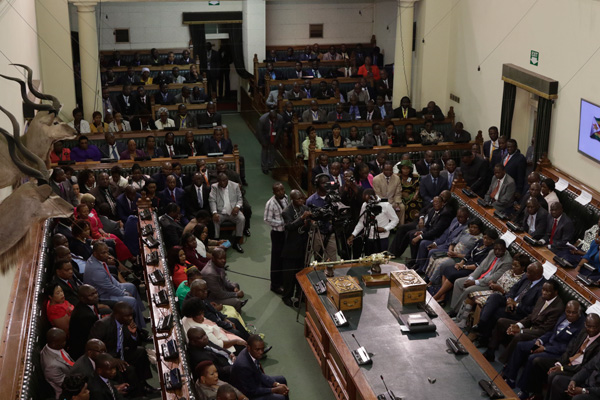Our friend, Theresa Mugadza-a lawyer and former Deputy Chairperson of the Anti-Corruption Commission- once watched an episode of a TV programme called “Constituency Watch” on our national broadcaster, Zimbabwe Broadcasting Corporation (ZBC). She was shocked by the things that many people believed said were the roles of their MP’s. These things ranged from attending funerals, paying school fees for under privileged children in primary school, managing the collection of bins, sinking and repairing boreholes, providing “projects” and “project funds”, giving motor vehicles and transport for constituents’ use, and giving counselling over the phone.
Theresa raised several very important questions. Why are there no NGOs educating people on the role of MPs? What are the MPs themselves doing for people to develop such unrealistic expectations of them? How many MPs can truthfully say they take the time to engage the people they represent to explain what their role is?
What is the role of your MP?
The role of your MP can not be separated from the role of Parliament itself because Parliament is made up of MPs. Without the MPs taking action, Parliament is a dead body.
So what is the role of Parliament?
Parliament has 4 very clear roles. These are oversight, legislation, representation and fostering public debate.
Oversight
In this role, Parliament has the duty to ensure that all government institutions perform in line with the law. In fact, Section 119 of the Constitution emphasises that Parliament has the supreme authority to promote democratic governance in Zimbabwe and to ensure that the State and all institutions and agencies of government at every level act ‘constitutionally and in the national interest.’ Parliament watches out for misconduct and illegal activities such as corruption and demands explanations. In this manner, institutions are held accountable.
What can you expect from your MP in performing this role?
Each MP belongs to a group in Parliament that focuses on specific issues. These groups are called Portfolio and Thematic Committees. Your MP has the duty to participate in meetings of his/her Portfolio Committee fully. In these Portfolio and Thematic Committees, your MP can raise questions to monitor government policies and programmes and ensure efficient use and allocation of national resources.
Within the Portfolio or Thematic Committees, your MP also has the duty to oversee the effective management of government Ministries and other departments by individual members of Cabinet to improve service delivery. This includes at the provincial and local government level. Your MP has the duty to ensure that all revenue is accounted for, that all expenditure is genuine/authentic and has been properly met, and that such expenditure does not exceed the funds allocated for that purpose.
Your MP also has the duty to raise issues that need attention in your community with members of other Portfolio Committees. This is because Portfolio Committees can carry out investigations of fact finding/discovering the truth on an issue that falls within their mandate.
An Example of how Committees work
In 2012-2013, the Parliamentary Portfolio Committee on Mines went to investigate the Marange diamond mines. They were responding to concerns that there was corruption on the mines, that the mines were not paying government enough money to help the Zimbabwean economy. There were concerns also, that the foreign mining companies were mostly benefitting from the mines, and that the people of Marange were displaced from their homes so that mining could be carried out where they used to live, but they were never given the houses that they had been promised by the mines.
The Portfolio Committee found that all these allegations were true and questioned the Minister of Mines-as the responsible authority-on what he was going to do to make sure that the situation was addressed. The Minister of Mines however ignored these questions and refused to go to Parliament to answer to these questions, acting in contempt of Parliament. The MPs had done their job and now it was up to the Minister to do his.
Under the oversight function, your MP also has the duty to contribute towards the making of, approval of and monitoring of the national budget. The debate leading to the approval of the budget is the critical point at which the MP can question inadequate allocation of resources to critical Ministries such as health and education as compared to Defence. Your MP has the role to demand budget lines for gender mainstreaming in every Ministry to ensure that the work of every Ministry is focused on ensuring equal access and opportunities for men and women, boys and girls.
The Constitution clearly provides that public funds must be directed towards national development and must be utilised in a transparent and accountable manner.
Legislative
Parliament is also known as the legislature. This come from its responsibility to legislate which is ‘… to make or enact laws’. Law-making is one of the most important and visible roles that your MP should play. Laws are made beginning with the process of the passing of bills (draft laws). Parliament can make laws that address issues for which no law has previously been made.
For Example Zimbabwe has a new Cyber Law Bill. We have never had one before because Zimbabwe never had needed to regulate how its people used the internet. This is a completely new law responding to new challenges.
Parliament can also make a new law from old laws by putting them in one basket and changing some issues (amendments).
For Example: In 2006 Parliament introduced the Criminal Law (Codification and Reform) Act. This law covers descriptions of many crimes that can be committed and which are punishable under Zimbabwean law. When it was introduced it combined many laws that had existed previously such as the Sexual Offences Act, the Miscellaneous Offences Act, the Aircraft (Offences) Act, the Concealment of Birth Act, the Infanticide Act and the Witchcraft Suppression Act. These laws no longer exist because they have been swallowed into the Criminal Law Code. It also introduced changes (amendments) to the Interpretation Act , the Burial and Cremation Act, the Customary Marriages Act, the Marriage Act, the Magistrates Court Act , the Prisons Act, the Criminal Procedure and Evidence Act, the Prevention of Corruption Act , the Stock Theft Act, the Anti-Corruption Commission Act, the Public Order and Security Act, the Police Act, the Inland Waters Shipping Act, the Tourism Act, the Dangerous Drugs Act, the Medicines and Allied Substances Control Act, the Public Health Act , the Termination of Pregnancy Act, the Housing and Building Act and the Mental Health Act.
Parliament can also change existing laws by introducing new things (amendments).
For example: Many people are calling for Parliament to amend existing laws to reflect the contents of the new Constitution. If the Constitution says Zimbabweans can also be citizens of another country at the same time (dual citizenship) then the Citizenship Act must be changed (amended) to show this.
What can your MP do to fulfil this role?
- Your MP can try and introduce a new law, if s/he feels that Parliament as a body is not taking action to introduce a law that s/he considers to be very important and urgent, or if the issue is not being given the attention it deserves, or if s/he just considers the law important for the benefit of the people s/he represents. This is called a Private Members Bill. In the 7th Parliament (2008-2013) Honourable Eric Matinenga tried to introduce a Private Member’s Bill to amend the Public Order and Security Act (POSA).
- Your MP can make suggestions to improve a law by participating in debates in Parliament when that law is brought before Parliament. In those debates, your MP has the duty to go through the Bills, interrogate them and ensure that they are in line with Constitution and that they address issues of national interest.
- Your MP can vote in favour of laws that would improve the lives of the people of Zimbabwe or against laws that would make life unbearable for Zimbabweans. For a law to be passed; it needs 50% of the vote of MPs who will be present and sitting on the day that the vote is carried out.
Representative
Your MP represents your interests in Parliament. There are 210 MPS for 210 constituencies and each constituency has its own issues. It is the responsibility of your MP to bring to the attention of the whole Parliament issues that affect your constituency, be it lack of roads road, lack of potable water, lack of health facilities such as clinics or any other pressing issues.
For example: In the 8th Parliament (2013-2018), Honourable Joseph Chinotimba, raised the issue of jackals that terrorised residents of Buhera, one of the areas he represents. While it may sound silly, within a few months, the Parks and Wildlife Authority of Zimbabwe had attended to the issue and the people of Buhera were safe from jackals.
Your MP represents the whole constituency. Once elected, that MP is no longer ZANU-PF Gamatox, ZANU PF –non-Gamatox, MDC-T, MDC-M, MDC-99, MDC Renewal or just MDC. The MP should never act in a way that makes it seems as if he or she represents only those who elected him or her or against those who opposed his or her election. They are not a member representing half the constituency but the whole constituency. For the MP to know what your constituency wants, he or she must organise regular meetings to consult and find out what people want.
Fostering public debate
Anyone who has ever participated in a debate knows that to effectively debate you must know the facts and develop arguments to support your case. This means you must have information that helps you to argue your point. Members of the public cannot debate when they do not know the issues. Thus, MPs have several tasks in this role.
First; to give out information to the people in their constituencies, second; to educate the people in their constituencies, and third; to create spaces for dialogue and debate.
For Example: Harare West Constituency MP Honourable Jessie Majome set up a Constituency Office where people can access information on events in her constituency and in Parliament. She distributes the Hansard (a booklet that records the debates in Parliament word for word). She opened Facebook and Twitter Accounts on social media where she frequently engages with people in her constituency. She explains to them what she is doing in Parliament. When she travels on Parliament business she explains where she is going, what she will be doing and gives updates on what is happening. She is available on the phone and via email to respond to enquiries on her constituents’ concerns. She even brings queries directly to local government officials when residents can’t reach their councillor. She also provides information on the motions that she moves in parliament, for instance the motion to introduce stiffer penalties for rape and other sexual crimes. She explains very clearly why she thinks those sentences are appropriate and why they should be put in place.
Now you see, this is what your MP should be doing and if he or she does this properly, our country will be a better place to live in. You will not need to ask him or her for money for a beer because employment will be created and you can buy your own beer. You will not need him or her to donate $100 for a casket at a funeral because you will be able to afford your own funeral cover. Basically if the MPs work to respect the Constitution and to improve Zimbabwe then they have done their job well!

